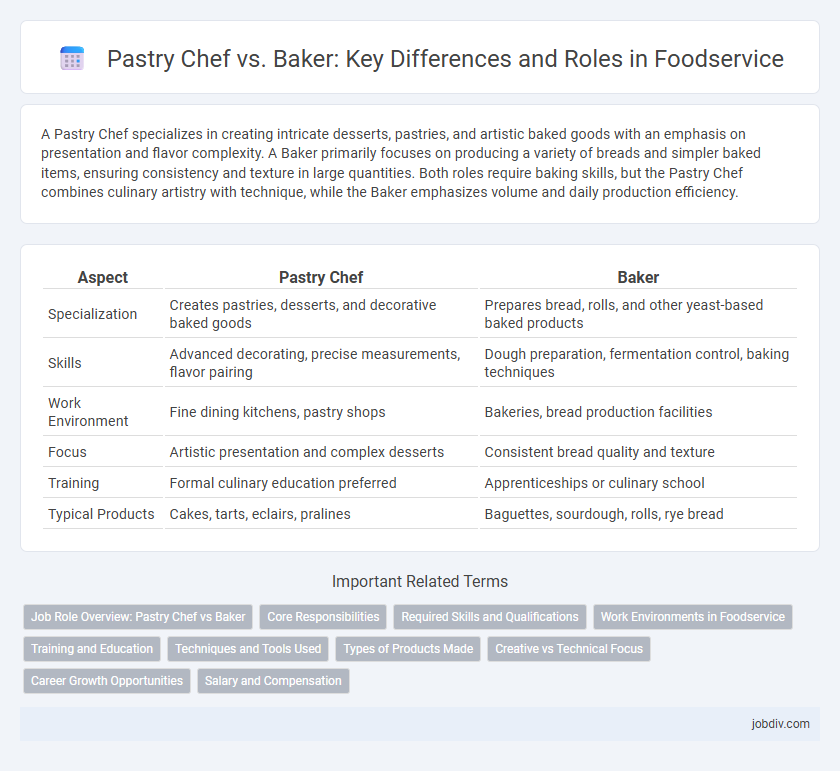A Pastry Chef specializes in creating intricate desserts, pastries, and artistic baked goods with an emphasis on presentation and flavor complexity. A Baker primarily focuses on producing a variety of breads and simpler baked items, ensuring consistency and texture in large quantities. Both roles require baking skills, but the Pastry Chef combines culinary artistry with technique, while the Baker emphasizes volume and daily production efficiency.
Table of Comparison
| Aspect | Pastry Chef | Baker |
|---|---|---|
| Specialization | Creates pastries, desserts, and decorative baked goods | Prepares bread, rolls, and other yeast-based baked products |
| Skills | Advanced decorating, precise measurements, flavor pairing | Dough preparation, fermentation control, baking techniques |
| Work Environment | Fine dining kitchens, pastry shops | Bakeries, bread production facilities |
| Focus | Artistic presentation and complex desserts | Consistent bread quality and texture |
| Training | Formal culinary education preferred | Apprenticeships or culinary school |
| Typical Products | Cakes, tarts, eclairs, pralines | Baguettes, sourdough, rolls, rye bread |
Job Role Overview: Pastry Chef vs Baker
Pastry chefs specialize in creating intricate desserts, pastries, and plated sweets, often developing recipes and overseeing presentation in high-end restaurants or hotels. Bakers focus on producing a wide range of bread, rolls, and baked goods, managing bulk production for bakeries or foodservice outlets. Both roles require expertise in dough preparation and baking techniques but differ in creativity scope and operational responsibilities.
Core Responsibilities
Pastry chefs specialize in creating intricate desserts, including tarts, pastries, and plated desserts, with an emphasis on presentation and flavor complexity. Bakers focus on producing a wide range of baked goods such as bread, rolls, and doughnuts, prioritizing consistency and volume for daily service. Both roles require expertise in dough preparation and baking techniques but differ in creative scope and product variety.
Required Skills and Qualifications
Pastry chefs require advanced skills in artistic decoration, flavor pairings, and precise baking techniques, often holding formal culinary education and certifications in pastry arts. Bakers focus on consistency, dough preparation, and large-scale production, typically needing strong knowledge of bread fermentation and commercial baking equipment, with qualifications ranging from apprenticeships to culinary diplomas. Both roles demand attention to detail, time management, and a strong understanding of ingredient properties to ensure high-quality baked goods.
Work Environments in Foodservice
Pastry chefs typically work in upscale restaurants, hotels, and specialty bakeries, where precision and creativity in desserts are paramount. Bakers often operate in commercial bakeries, supermarkets, or large-scale production facilities, focusing on mass production of bread and baked goods. Both roles require early hours and fast-paced environments, but pastry chefs usually have more specialized tasks tied to artistic presentation.
Training and Education
Pastry chefs typically undergo specialized culinary training focusing on advanced pastry techniques, cake decorating, and dessert artistry, often earning certifications from culinary institutes. Bakers usually receive vocational training or apprenticeships concentrating on bread production, dough preparation, and baking fundamentals, sometimes supplemented by community college programs. Both roles benefit from hands-on experience, but pastry chefs require deeper knowledge of flavor pairings and presentation, while bakers emphasize consistency and fermentation processes.
Techniques and Tools Used
Pastry chefs specialize in refined techniques such as tempering chocolate, laminating dough, and intricate cake decorating, frequently using tools like pastry bags, offset spatulas, and silicone molds. Bakers focus on bulk production techniques including dough fermentation, proofing, and consistent oven management, typically utilizing equipment such as dough mixers, proofing cabinets, and commercial ovens. Both professions require mastery of precise temperature control and ingredient measurements, but the pastry chef's work emphasizes artistic presentation while the baker prioritizes volume and consistency.
Types of Products Made
Pastry chefs specialize in creating intricate and delicate desserts such as eclairs, tarts, and pate a choux, emphasizing artistic presentation and complex flavor profiles. Bakers focus on producing staple baked goods like bread, rolls, and basic cakes, prioritizing consistency and bulk production. Both professionals require expertise in dough handling, but their product ranges and techniques cater to distinctly different culinary demands within the foodservice industry.
Creative vs Technical Focus
Pastry chefs prioritize creativity, designing visually stunning and innovative desserts that elevate the dining experience with unique flavor combinations and artistic presentation. Bakers emphasize technical precision, focusing on consistent dough preparation, fermentation, and baking processes to ensure reliable quality and texture in bread and pastries. Both roles require extensive culinary skills, but pastry chefs often drive the menu's aesthetic appeal while bakers maintain foundational production standards.
Career Growth Opportunities
Pastry chefs often experience accelerated career growth through specialization in gourmet techniques, high-end establishments, and product innovation, while bakers build foundational skills with opportunities in large-scale production and artisan baking. Both career paths offer advancement potential; pastry chefs can progress to executive roles or open boutique patisseries, whereas bakers may become head bakers or manage bakery operations. Mastery of advanced skills, certifications, and industry reputation significantly impact growth trajectories in the foodservice sector for both professions.
Salary and Compensation
Pastry chefs typically earn higher salaries than bakers due to their specialized skills in creating intricate desserts and plated presentations, with average annual salaries ranging from $40,000 to $65,000 compared to bakers' $25,000 to $45,000. Compensation for pastry chefs may include bonuses and tips, especially in upscale restaurants, while bakers often receive stable hourly wages with potential overtime pay. Factors influencing salary differences include experience, location, and the establishment's prestige within the foodservice industry.
Pastry Chef vs Baker Infographic

 jobdiv.com
jobdiv.com